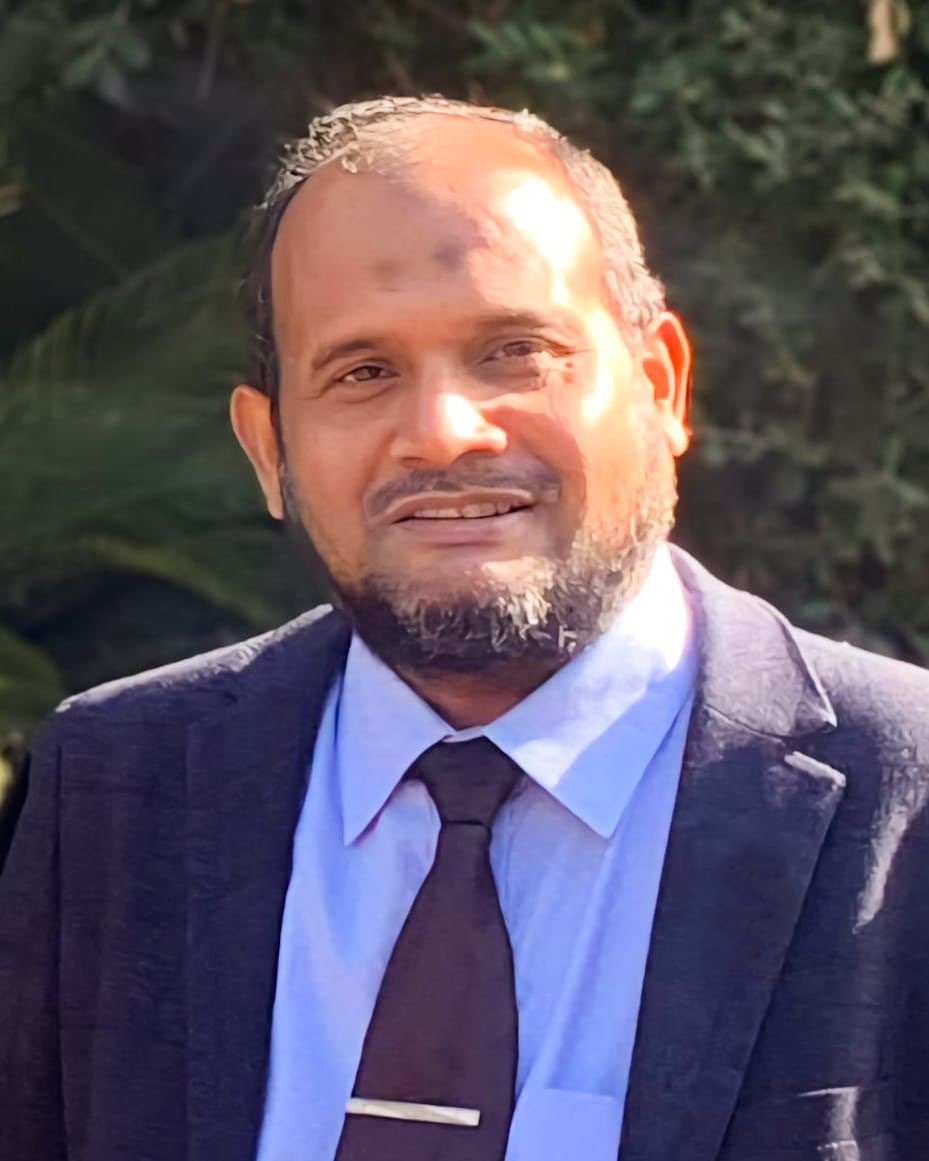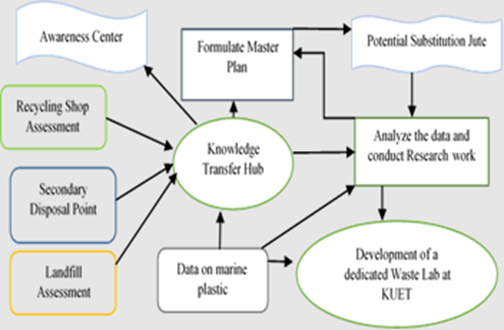Massage from Project Director
“Plastic and Micro-plastic pollution in the marine environment are of great concern to safeguard the environment and ecosystem in coastal cities of Bangladesh and hence deserve an urgent response involving all relevant actors at different levels”
 The aim of the project is to alleviate land-based point-source generation of plastic waste to the aquatic and marine stream flow through collaborative research, extensive data sharing and implementation measures.
Project Constellation
It is an immense pleasure for me to be involved in SCIP Plastic Project as a project and work very closely with Prof. Dr. Muhammed Alamgir, Department of Civil Engineering (presently on deputation in UGC), KUET and Prof. Dr.-Ing. Eckhard Kraft, Bauhaus-universität Weimar (BUW), Germany, who is the Leader of this project. Our gratefulness to the Federal Ministry for the Environment, Nature Conservation, Nuclear Safety and Consumer Protection, Germany for providing fund to this significantly challenging project covering comprehensively interconnected spectrum of environment as well as marine pollution by inland and marine plastic streamflow. Firstly, the fundamental constituents of SCIP Project demands establishment of a knowledge transfer HUB at KUET campus, Bangladesh to reduce and prevent marine plastic debris in the Bay of Bengal. The HUB is going to be a station for developing a master plan with the collaboration of inter disciplinary actors based on economy, politics and local community. The decade long collaboration between Prof. Dr.-Ing. Eckhard Kraft, Bauhaus-universität Weimar (BUW), Germany and Department of Civil Engineering, KUET started back in 2007.Through such collaboration, KUET became familiar with sustainable international platforms like WasteSafe International Conference in KUET since 2009, ICCESD International Conference In KUET from 2012, SARDINIA International Symposium since 2007, Detritus Journal, International Waste Working Group (IWWG) and ORBIT Group.
The aim of the project is to alleviate land-based point-source generation of plastic waste to the aquatic and marine stream flow through collaborative research, extensive data sharing and implementation measures.
Project Constellation
It is an immense pleasure for me to be involved in SCIP Plastic Project as a project and work very closely with Prof. Dr. Muhammed Alamgir, Department of Civil Engineering (presently on deputation in UGC), KUET and Prof. Dr.-Ing. Eckhard Kraft, Bauhaus-universität Weimar (BUW), Germany, who is the Leader of this project. Our gratefulness to the Federal Ministry for the Environment, Nature Conservation, Nuclear Safety and Consumer Protection, Germany for providing fund to this significantly challenging project covering comprehensively interconnected spectrum of environment as well as marine pollution by inland and marine plastic streamflow. Firstly, the fundamental constituents of SCIP Project demands establishment of a knowledge transfer HUB at KUET campus, Bangladesh to reduce and prevent marine plastic debris in the Bay of Bengal. The HUB is going to be a station for developing a master plan with the collaboration of inter disciplinary actors based on economy, politics and local community. The decade long collaboration between Prof. Dr.-Ing. Eckhard Kraft, Bauhaus-universität Weimar (BUW), Germany and Department of Civil Engineering, KUET started back in 2007.Through such collaboration, KUET became familiar with sustainable international platforms like WasteSafe International Conference in KUET since 2009, ICCESD International Conference In KUET from 2012, SARDINIA International Symposium since 2007, Detritus Journal, International Waste Working Group (IWWG) and ORBIT Group.  Such extensive as well as long term collaboration with BUW has helped Department of Civil Engineering, KUET to receive this geographically and scientifically significant project on Sustainable Capacity Building to Reduce Irreversible Pollution by Plastics (SCIP Plastics Project). Bangladesh approximately produces 336,000tons of plastic waste per year, which is on the rise. According to numerous scientific studies, on an average, per capita plastic consumption has been found to be 6 kg per annum and plastic contains in around 60% of the all-household waste. Moreover, non-degradable plastic waste accounts for 73% of the litter in the aquatic system and 50% of them are discarded after a single use. Furthermore, literature reviews reveal that, due to lack of proper segregation at the dumping point around 17000 tons of soft plastics are being dumped in the landfill with regular kitchen waste. On the occasion of the World Environment Day during 2018, Hon’ble President of the People’s Republic of Bangladesh, His Excellency Mr. M Abdul Hamid indicated the rise in environmental pollution due rapid urbanization and industrialization. Hon’ble President quoted, “The adverse impacts of environmental pollution are visible in different sectors” and “Observing that polythene and plastic are the main components of environmental pollution.” He further added “That is why proper management of plastic waste is a must.” Thus, the focus of SCIP Plastics project is to reorganize waste management structure of KCC in order to mitigate inland plastic deposition to aquatic system. A dedicated waste management department is to be founded inside KCC, which is expected to continue operations after the closure of the project. Furthermore, Mongla port municipality will be benefitted in a more abstract manner where the plastic deposition estimation of marine plastic, transshipment composition and repackaging analysis will be conducted which will further be used for formulation of a master plan. Nirala 24. No. ward will be benefited through pilot implementation of the solid waste management and specifically collection and characterization of plastic waste. Moreover, the Bangladesh Jute Association will significantly be branded and economically benefitted through SCIP Project. Additionally, an uncontrolled landfill without safety monitoring is a significant source of pollution where specific attention must be provided. Furthermore, planned pilot measures must be ensured through SCIP project to mitigate the targeted emission paths. Finally, the most significant outcome of this 32 months period project is to formulate a master plan for the national transformation opportunities for a sustainable as well as developed Bangladesh.
Such extensive as well as long term collaboration with BUW has helped Department of Civil Engineering, KUET to receive this geographically and scientifically significant project on Sustainable Capacity Building to Reduce Irreversible Pollution by Plastics (SCIP Plastics Project). Bangladesh approximately produces 336,000tons of plastic waste per year, which is on the rise. According to numerous scientific studies, on an average, per capita plastic consumption has been found to be 6 kg per annum and plastic contains in around 60% of the all-household waste. Moreover, non-degradable plastic waste accounts for 73% of the litter in the aquatic system and 50% of them are discarded after a single use. Furthermore, literature reviews reveal that, due to lack of proper segregation at the dumping point around 17000 tons of soft plastics are being dumped in the landfill with regular kitchen waste. On the occasion of the World Environment Day during 2018, Hon’ble President of the People’s Republic of Bangladesh, His Excellency Mr. M Abdul Hamid indicated the rise in environmental pollution due rapid urbanization and industrialization. Hon’ble President quoted, “The adverse impacts of environmental pollution are visible in different sectors” and “Observing that polythene and plastic are the main components of environmental pollution.” He further added “That is why proper management of plastic waste is a must.” Thus, the focus of SCIP Plastics project is to reorganize waste management structure of KCC in order to mitigate inland plastic deposition to aquatic system. A dedicated waste management department is to be founded inside KCC, which is expected to continue operations after the closure of the project. Furthermore, Mongla port municipality will be benefitted in a more abstract manner where the plastic deposition estimation of marine plastic, transshipment composition and repackaging analysis will be conducted which will further be used for formulation of a master plan. Nirala 24. No. ward will be benefited through pilot implementation of the solid waste management and specifically collection and characterization of plastic waste. Moreover, the Bangladesh Jute Association will significantly be branded and economically benefitted through SCIP Project. Additionally, an uncontrolled landfill without safety monitoring is a significant source of pollution where specific attention must be provided. Furthermore, planned pilot measures must be ensured through SCIP project to mitigate the targeted emission paths. Finally, the most significant outcome of this 32 months period project is to formulate a master plan for the national transformation opportunities for a sustainable as well as developed Bangladesh.

